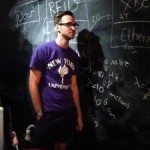Undergraduates in the Archives – Gotkin 2
By
Kevin Gotkin
February 2012
2What are the benefits of doing so, pedagogically and intellectually?
Kevin Gotkin
BA in Media, Culture, and Communication, Class of 2011 – NYU
PhD Student, Annenberg School for Communication – University of Pennsylvania
¶ 1 Leave a comment on paragraph 1 0 My experience in the archive directly contributed to my interest in graduate school, which is perhaps unsurprising when you think about the demands of archival work. The move from undergraduate to graduate study shares the guiding principles of archival work. You must first learn what others have said, before delving into the topics that demand further examination. Archival research, in this sense, is the never-ending game of hide-and-seek with that perfect research subject we yen for in each new project, class, and semester.
¶ 2 Leave a comment on paragraph 2 0 Aside from its importance in training future scholars, archival work is significant even for students who have less professional allegiance to the academy. Original research is a principle worth incorporating in undergraduate course design, as it signifies the marketable job-placement skills that supposedly evidence proper university training. In the 1997 Harper’s Magazine essay “On the Uses of a Liberal Education,” Mark Edmundson suggests undergraduate study has become “lite entertainment for bored college students.” He writes, “University culture, like American culture writ large, is, to put it crudely, ever more devoted to consumption and entertainment, to the using and using up of goods and images.”[1] Edmundson goes on to argue that the transactional nature of undergraduate study creates an imbalance between what professors put into a syllabus and what students get out of it. But if we think about archival research as a process of skill development, it just may serve as a corrective to the literal and figurative banking of education.
¶ 3 Leave a comment on paragraph 3 0 Archival work is often thought to be methodologically opposed to new media research techniques; thus, the theory goes, undergraduates, as “digital natives,” must learn and maintain a skill set in the archive apart from their new media literacy. How, for example, should undergraduates be expected to navigate the thick mess of a paper archive when Facebook and Twitter are their daily information grounds, where information streams are updated automatically and search boxes are never further than the top of the page? If the job market is increasingly concerned with social media, why should students spend time poring over “dead” technologies? Contrary to the notion that the archive and new media are irreconcilable, we might instead think of them as complementary educational forces. It is no coincidence, for example, that undergraduates in the archive are more likely to be keen and discerning arbiters of information.


0 Comments on the whole post
Leave a comment on the whole post
0 Comments on paragraph 1
Leave a comment on paragraph 1
0 Comments on paragraph 2
Leave a comment on paragraph 2
0 Comments on paragraph 3
Leave a comment on paragraph 3